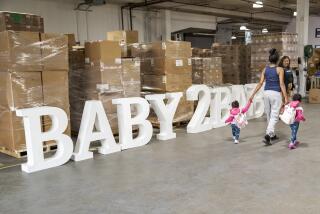Project Opens Doors for Babies Left Abandoned
- Share via
HAMBURG, Germany — Foundlings left on the doorsteps of churches, orphanages or other kind benefactors have been sent to better lives by desperate mothers at least since biblical times, when Moses was floated down the Nile to safety.
But in a wealthy country such as Germany, with one of the best social security nets in the world, few people thought to look far back for a solution to the disturbingly recurrent problem of unwanted newborns being abandoned to cold and hunger.
With today’s inauguration of Germany’s first designated foundling drop-off site since the 1700s, child welfare workers hope that the option of a safe and anonymous abandonment will save lives among the 40 or so castoff newborns found nationwide each year, most dead from exposure.
Project Findelbaby--or foundling--is little more than a night-deposit box with a warm bed beyond the delivery slot and a sensor that alerts caretakers of an arrival. The brainchild of social workers in this port city that has long been a magnet for prostitutes, runaways and drug addicts, the receptacle in the ground-floor door of a day-care center allows the hand-over of unwanted infants with no questions asked.
“We think the ones who throw their babies away do so out of panic. They’re in shock and simply don’t know what to do with them,” says Heidi Rosenfeld, a social worker with the project’s creator, the SterniPark child welfare agency, which operates children’s homes and day-care centers in Hamburg.
The first of two baby drop boxes planned for this city is on Goethestrasse, a leafy street of old row houses and brick apartment buildings two blocks from the Hamburg-Altona train station. Like the nearby area of St. Pauli with its infamous Reeperbahn--Hamburg’s red-light district--frequented by sailors and itinerants for centuries, the station is a hangout for those on the social fringes.
Signs in six languages have been posted throughout the city noting the drop-off location and a 24-hour phone number women can call to arrange pickup of unwanted infants anywhere in the country. After a hospital examination, the babies are cared for in foster homes for eight weeks to give the mothers a chance to reconsider before the infants become available for adoption.
The initiative for Findelbaby came after five local instances last year in which a newborn was discovered abandoned in dangerous circumstances. In December, sorters at a recycling plant found the body of a suffocated infant in a shoe box amid the refuse in one of its paper receptacles. The company donated about $3,700 to SterniPark’s $125,000 project, which plans to open a second deposit site this year.
“There’s been this hole in the system for some time now,” says Herbert Wiedermann, head of Hamburg’s family welfare division. “This furtive handing-over of babies seems like going back to a practice from the Middle Ages, but our main objective is to save lives. Even if only one is rescued, it’s worth it.”
Interest in the project has taken off across Germany, especially after the harrowing disclosure at a trial in the city of Chemnitz earlier this month that a woman had hidden three pregnancies from her violent husband and killed the infants shortly after their births. Sentenced to 13 years, the 27-year-old mother--who has two other children--told the court that she thought she had nowhere to turn when the husband threatened to kill her if she bore another child.
Federal Families Minister Christine Bergmann has lauded the Hamburg project and called on other large cities to create similar opportunities for mothers who fear dealing with hospitals and going through child welfare channels.
Women in the most desperate straits often avoid hospitals because they would be obliged to register the birth. Those behind Findelbaby want regulations eased to ensure that all babies are born under safe conditions.
“We want a change in the law to allow births in hospitals to be anonymous if necessary,” says Rosenfeld of SterniPark. “We think it is a huge risk for the woman and the infant when there is no medical assistance. And it’s far better for the baby to be left in a hospital than in a trash can.”
More to Read
Sign up for Essential California
The most important California stories and recommendations in your inbox every morning.
You may occasionally receive promotional content from the Los Angeles Times.











